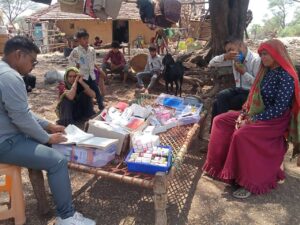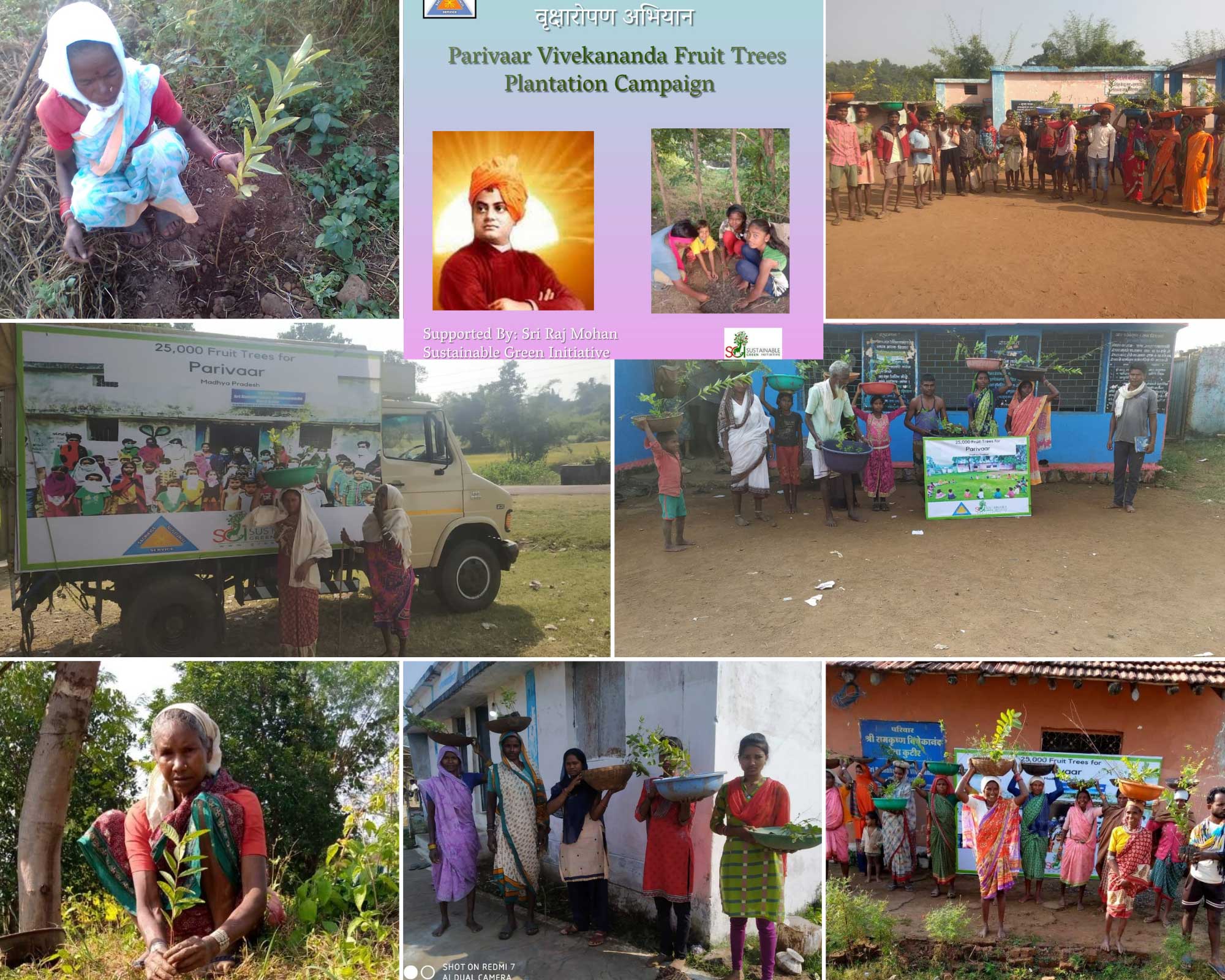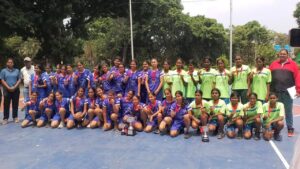Over 500,000 Fruit Trees to be planted and taken care of by 50 thousand families in 5 districts of Madhya Pradesh in next 12 months.
Last week we have launched a major campaign of planting 500 thousand fruit trees with support from Raj Mohan Mr Rajmohan’s Sustainable Green Initiative.
The campaign got kickstarted on the auspicious day of Sister Nivedita’s Birthday (28th Oct). In the first five days itself we have reached more than 2600 families in 30 villages and provided them with 6-10 saplings each with a total of 25,000 trees being planted currently.
Each of these families have been given :
1. Anaar (Pomegranate)
2. Amrood (Guava)
3. Sitaphal (Custard-apple))
4. Aanwla (Indian Goseberry)
5. Moringa (Drumstick)
Additionally a large number of lemon saplings have been given.
All of these grow to full size and yield in next few years. It was a fairly big logistical exercise to mobilize so many people for this. The saplings reached with much care and proper management and were sent to all these villages. Children, their guardians and even the most elderly – all participated in this event. Parivaar Sevavratees of Mandla led by Manish and Pratik with the overall mentorship of Digvijay Singh , put their best efforts for a task which they had little time to prepare.
Almost all of these tree saplings are being planted in individual family lands near their houses here called as ‘Baadis’ . This would help the family manage it more efficiently and also provide timely water which they can do using kitchen waste water. Proper management processes have been instructed across for successful growing of these saplings into fully grown fruit trees. We hope this would be a significant movement not only ecologically significant but also providing a high nutrient diet of fruits at the individual family level.
The choice of trees was done based on local soil and climatic conditions. All these trees are native to this area and have decreased in numbers considerably over decades, and an area which was bestowed with such nutritional fruit varieties today suffers from malnutrition. In the hope of more such steps to restore the rich fruit diet in the lives of people in the region and with more elaborate planning this can be extended to larger barren areas in such villages which are also increasing in size.
Below is the details of how the process has happened/happening on ground.
For the first few days, all the details and pieces of information regarding this Plantation drive were consistently communicated to Parivaar Seva Kutir cadre and from them it was broadcast among the villagers. Our team had prepared a few posters to sensitize peoples about this mission, as a part of ecological education. Some hard posters were put and a much wider circulation was done through social media in the local areas. Out team also prepared a list of families from each Kutir who will be taking saplings for plantation.
After the saplings received:-Unloading was carefully done at Mohgaon Office using Taslaas as directed by the Surviving Green team / Shri Raj Mohan. Everyone was taught the proper method of handling the saplings during the transportation process. On the first day, delivery in our 28 Seva Kutirs of Mohgaon block in Mandla district was done, followed by the distribution of saplings.Before distributing saplings at the Seva Kutirs, we interacted again with villagers on those related topics like how to plant, why plant trees, benefits to the environment, fruit availability and malnutrition among children and how an increased fruit diet can help towards addressing that.
During Distribution at Kutirs. Villagers, Nirashrayi (uncared for), Elderly peoples and Children were present at the Kutirs for saplings. Children were eagerly waiting at Kutirs. We have given saplings to some Upper Primary students as they had done all basic preparations for planting those saplings. Everyone came with Taslaas as told by us for the saplings.
What’s Next ?
Now our next step is to ensure that maximum / all saplings survive.For this, we have given the responsibility of protecting, nurturing and watering those saplings to Kutir students. Our Kutir staff and teachers will ask the children about saplings each day and periodically inspect them. Our Kutir staffs are visiting those families to see the condition and growth of saplings and to guide those families if needed. Our team will prepare an observation chart which can also be easily prepared by children using chart papers or Sheets. Through these observation charts, children can track the growth and the changes happening in plants. By this, children can engage themselves closely with plants in a better way along with developing understanding about ecology and environment. Overall, this is a completely new dimension in Parivaar’s work and given Parivaar’s reach and footprint in interior tribal areas, covering several districts and tens of thousands of families, this is already a fairly sizable mass movement in these areas.
[ I am grateful to Digvijay Singh, overall mentor of our Seva Kutirs in Mandla district, for inputs and basic draft of this note ]
Comments

Update
15 More Mobile Medical Clinics (MMCs) launched in last 3 months.
15 More Mobile Medical Clinics (MMCs) launched in last 3 months.We have started 15 more MMCs in several impoverished tribal blocks in Madhya Pradesh in



